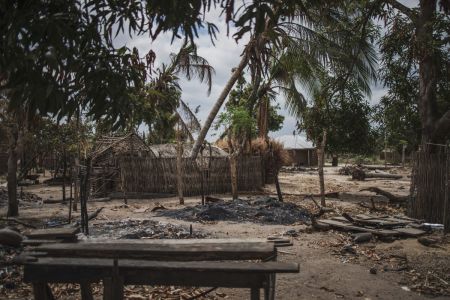565K displaced, 2,500 killed amid rise of Islamic extremism in Mozambique since 2017

Violent extremist attacks that have led to the displacement of over half-a-million people and more than 1,300 civilian deaths in northern Mozambique in recent years decreased in January as government forces try to expel Islamic rebels from the Cabo Delgado province.
Reports have indicated a lull in violent extremist events reported from the troubled province where hundreds of terror attacks have been carried out since 2017 by local extremists thought to be aligned with Ahlu Sunnah wa-l-Jama’ah, which pledged allegiance to the Islamic State.
According to the Armed Conflict Location & Event Data Project (ACLED), the Cabo Delgado province has suffered from 776 “organized violence events” since 2017, 2,578 "fatalities from organized violence" and 1,305 “fatalities from civilian targeting.”
The United Nations estimates that 565,000 people fled their homes and villages due to attacks by non-state groups.
ACLED data indicates that there were 10 militant strikes in January. AFP reports that the total is down from the 30 militant strikes recorded in December.
As government forces have engaged in efforts to defeat the terrorists, some reports have given credit for the decline in attacks to the rise of government land and airstrikes.
However, ACLED has warned against giving the government forces too much credit for the January decline.
“The rainy season decline in insurgent attacks in Cabo Delgado has led to speculation that the government has made significant military gains against the insurgency in recent weeks, a narrative that has also appeared in pro-government propaganda,” a weekly ACLED update posted during the first week of February states.
“There are encouraging signs for the government on the security front, and last week’s offensive in Mocimboa da Praia has the potential to bring more. However, the lack of insurgent activity in January is not necessarily indicative of government success.”
The international violence data collective notes in its analysis that rain and the lack of agricultural production present problems annually around this time of year. The result is a restrain on insurgent action no matter what government gains there are.
“As an example, in January 2020, ACLED records 25 total events involving insurgents resulting in 50 fatalities in Cabo Delgado,” the database explains. “This January, there were a comparable 22 total events involving insurgents, resulting in 47 fatalities. Far from predicting the decline of the insurgency, the conflict’s slow pace in January 2020 preceded the insurgent’s most successful year by far.”
ACLED gave the government credit for making conditions safe enough for Doctors Without Borders to return to the Macomia district, where the humanitarian group can help 100 patients per day. The organization suspended its program in the region last June after insurgents attacked a health center there.
“That MSF is now able to return to Macomia suggests a major improvement in the prospects for security there,” ACLED reports. “It also represents a major quality of life improvement for civilians in the district.”
Calton Cadeado, a security researcher at the Joaquim Chissano University in Maputo, told AFP that he sees the “success of the government forces' offensive strategy.”
As the outlet reports, government troops last month launched a series of airstrikes on the Palma district, the land hub for a gas project in the province. Forces were also said to have killed several insurgents hiding in a mosque.
The military offensive to eliminate the terror group, known locally as Al-Shabaab but not connected to the Somalia-based group with the same name, has come under scrutiny. Activists have accused the military of indiscriminately killing anyone accused of working with the terror group. However, Cadeado told AFP that the relationship between the military and local residents has "improved a lot" recently.
Mozambique and Portugal are preparing a bilateral security cooperation program that is to be finalized in February. According to ACLED, the agreement will replace an existing deal. The new deal will include the training of Mozambican military forces by Portuguese counterparts.
A new report from the Mozambican Bar Association accuses the government of failing to protect human rights in the province. The association accused the government of not having “a strategy for preventing and combating terrorism.”
"[T]he government has wasted opportunities for international cooperation in preventing and combating terrorism, within the scope of the country's adhesion to international conventions,” the report reads.
In January, Portuguese Foreign Affairs Minister Augusto Santos Silva told the media that he expects a deal to provide European Union assistance to Mozambique to be completed “in the coming weeks.”
Mozambique ranks as the 45th worst country for Christians on Open Doors USA’s 2021 World Watch List. This year’s report is the first time the country is listed on Open Doors’ annual list. Extremist attacks have killed many Christians and terrorists have burned down churches and schools.





















